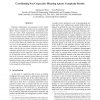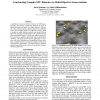1047 search results - page 8 / 210 » Learning the required number of agents for complex tasks |
ALIFE
2010
13 years 6 months ago
2010
Embodied artificial intelligence argues that the body and brain play equally important roles in the generation of adaptive behavior. An increasingly common approach therefore is to...
GECCO
2008
Springer
13 years 8 months ago
2008
Springer
This paper presents a communication-less multi-agent task allocation procedure that allows agents to use past experience to make non-greedy decisions about task assignments. Exper...
IAT
2005
IEEE
14 years 1 months ago
2005
IEEE
Whenever independent, non-cooperative actors jointly have to solve a complex task, they need to coordinate their efforts. Typical examples of such task coordination problems are s...
E4MAS
2006
Springer
13 years 11 months ago
2006
Springer
One large and quite interesting family of MAS applications is characterized (1) by their large scale in terms of number of agents and physical distribution, (2) by their very dynam...
AIIDE
2008
13 years 10 months ago
2008
It is difficult to discover effective behavior for NPCs automatically. For instance, evolutionary methods can learn sophisticated behaviors based on a single objective, but realis...


